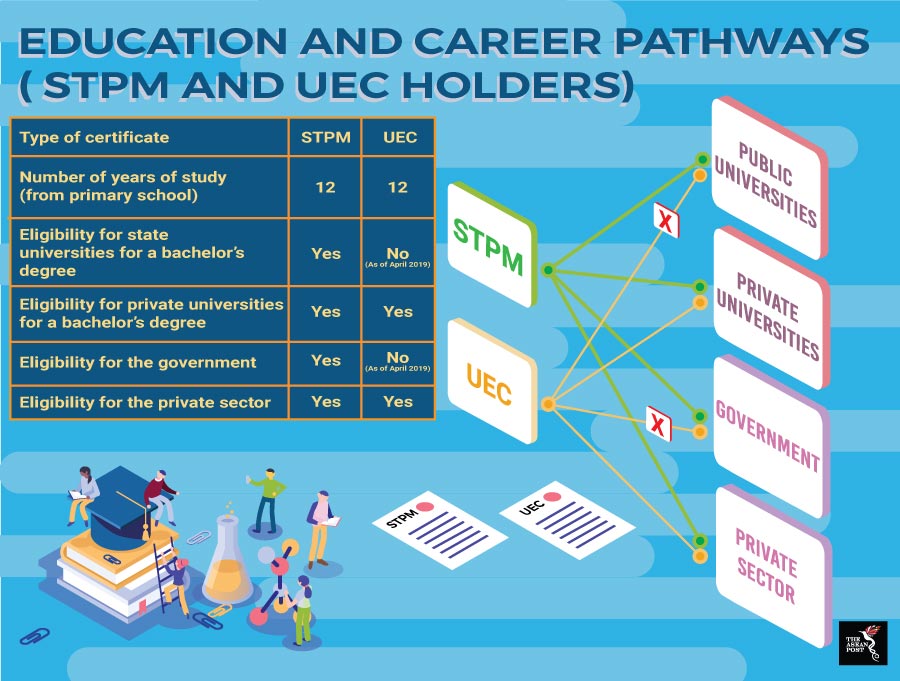During its campaigning before the 14th general election (GE14) in Malaysia, the Alliance of Hope (Pakatan Harapan) declared in its manifesto that the coalition would recognise the Unified Examination Certificate (UEC) qualification if they were elected into power. Almost a year has passed since coming into power, but that promise has yet to be fulfilled by the new government. Malaysia’s minister of education, Maszlee Malik has said that the matter is currently under study by a special taskforce.
The UEC is a standardised test organised by the United Chinese School Committees Association of Malaysia (Dong Jiao Zong) based on curriculum taught in Independent Chinese Secondary Schools (ICSS) that is an amalgamation of many curriculums – from Taiwan to China – and even includes some Malaysian influences.
Trouble brewed when Malaysia’s Attorney General (AG), Tommy Thomas, issued a statement this week which said that UEC Senior Middle 3 certificate holders are just as eligible as Higher School Certificate (STPM) holders to sit for the Certificate in Legal Practice (CLP) Examination. The statement caused speculation among Malaysia’s netizens who felt this was a “stealth” announcement by the Malaysian government that it recognised the UEC qualification.
The alleged attempt by the Malaysian government to recognise the UEC has received a backlash from many observers. One of whom is Prof. Dr Teo Kok Seong, Principal Research Fellow at the Institute of Ethnic Studies (KITA), National University of Malaysia (UKM) who told a local daily recently that recognising the UEC would be “unfair” to holders of the Malaysian Certificate of Education (SPM) and the Higher School Certificate (STPM).
A “betrayal”
In an interview with TV Pertiwi in 2018, Prof. Dr Teo Kok Seong said that by recognising the UEC as a certificate to apply for entrance into public universities or to qualify for government jobs, the government of Malaysia is actively betraying not only the Bumiputeras (Sons of the Soil), but also the many ethnic-Chinese who trust the Malaysian education system.

Recognising the UEC could also compromise Malaysia’s national identity. Prof Dr Teo Kok Seong, in the same interview, said that the Malaysian education system – from the way it is presented in Bahasa Malaysia (Malaysia’s national language) to the compulsory nature of subjects like History and Islamic or Moral studies – was designed to educate students about being Malaysian and it would be unfair to national certificate holders if UEC graduates who studied mostly in Chinese and English, were allowed into the government service where most of the work is carried out using Malaysia’s national language, Bahasa Malaysia.
However, the UEC does take into consideration the national language whereby candidates are required to obtain a credit in Bahasa Malaysia, according to Dr Wee Ka Siong, President of the Malaysian Chinese Association (MCA).
Potential brain drain
On the other hand, the UEC qualification could present Malaysia’s students with more opportunities abroad. Over a thousand institutions around the globe recognise the UEC qualification said Dr Wee Ka Siong. By not recognising the qualification, the government of Malaysia could inadvertently be forcing UEC graduates to study abroad and even seek employment in countries that recognise it. This could lead to a potential brain drain.
This sentiment was echoed by former Minister of Plantation Industries and Commodities, Mah Siew Keong, who said that it is much cheaper for the government to simply recognise the UEC than to invest in TalentCorp. to persuade Malaysians working abroad to return home. The threat of losing capable manpower is a real possibility should the government there continue to not recognize the UEC.
A possible way out of this divide is to integrate the UEC qualification into the current single-stream system as suggested by Dr Rais Yatim, a Supreme Leadership Council Member of the Malaysian United Indigenous Party (PPBM), pointing to India, Indonesia, Singapore and the United Kingdom (UK) as examples. He said that if successful, the resulting syllabus will help pave a better future not only for ethnic-Chinese, but every student in Malaysia.
It is still up in the air whether the Alliance of Hope-led Malaysian government will recognise the UEC as per their manifesto. This uncertainty is further exacerbated by prime minister, Dr Mahathir Mohamad, who said in 2018 that election manifestos are not “holy books” and could be implemented or not depending on the circumstances.
However, judgement should be reserved until the aforementioned special taskforce releases its final report regarding the matter in July 2019. Regardless of the outcome, the government needs to find a workable compromise so that every student in Malaysia receives equal opportunity regardless of their economic or ethnic backgrounds.
Related articles:
